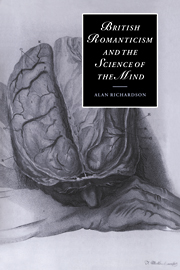Book contents
- Frontmatter
- Contents
- List of illustrations
- Preface
- List of abbreviations
- 1 Introduction: neural Romanticism
- 2 Coleridge and the new unconscious
- 3 A beating mind: Wordsworth's poetics and the “science of feelings”
- 4 Of heartache and head injury: minds, brains, and the subject of Persuasion
- 5 Keats and the glories of the brain
- 6 Embodied universalism, Romantic discourse, and the anthropological imagination
- 7 Epilogue
- Notes
- Bibliography
- Index
- CAMBRIDGE STUDIES IN ROMANTICISM
3 - A beating mind: Wordsworth's poetics and the “science of feelings”
Published online by Cambridge University Press: 22 September 2009
- Frontmatter
- Contents
- List of illustrations
- Preface
- List of abbreviations
- 1 Introduction: neural Romanticism
- 2 Coleridge and the new unconscious
- 3 A beating mind: Wordsworth's poetics and the “science of feelings”
- 4 Of heartache and head injury: minds, brains, and the subject of Persuasion
- 5 Keats and the glories of the brain
- 6 Embodied universalism, Romantic discourse, and the anthropological imagination
- 7 Epilogue
- Notes
- Bibliography
- Index
- CAMBRIDGE STUDIES IN ROMANTICISM
Summary
In 1799 one T. O. Churchill completed his translation of Herder's Outlines of a Philosophy of the History of Man, published in London the next year. Among many remarkable passages, it includes this one on the infant's creation of an object world through passionate interaction with its mother:
The suckling at the mother's breast reposes on her heart: the fruit of her womb is the pupil of her embrace. His finest senses, the eye and ear, first awake, and are led forward by sound and figure: happy for him, if they be fortunately led! His sense of seeing gradually unfolds itself, and attentively watches the eyes of those around, as his ear is attentive to their language, and by their help he learns to distinguish his first ideas. (91)
An English poet also writing in 1799 captured the same developmental process in closely analogous, but more memorable, terms:
– blest the babe
Nursed in his mother's arms, the babe who sleeps
Upon his mother's breast, who, when his soul
Claims manifest kindred with an earthly soul,
Doth gather passion from his mother's eye.
Such feelings pass into his torpid life
Like an awakening breeze, and hence his mind,
Even in the first trial of its powers,
Is prompt and watchful, eager to combine
In one appearance all the elements
And parts of the same object, else detached
And loath to coalesce.
(Prelude 1799 2: 269–80)- Type
- Chapter
- Information
- British Romanticism and the Science of the Mind , pp. 66 - 92Publisher: Cambridge University PressPrint publication year: 2001



